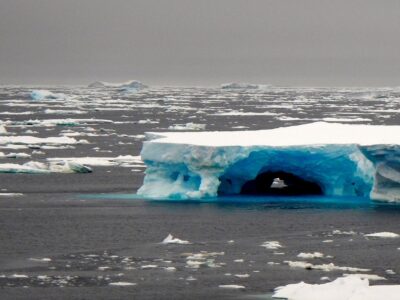
Image credit: NASA
A new study shows that four out of five Alaskans believe global warming is happening and is a serious threat to the state. The statewide survey involved telephone interviews with more than 1,000 Alaskan adults, and was conducted early this summer.
The study was commissioned by Anthony Leiserowitz, principal investigator with the Center for Research on Environmental Decisions (CRED) at Columbia University and research scientist at Decision Research, and conducted by the Craciun Research Group. This survey was funded by the National Science Foundation.
“Across the board, no matter what political affiliation or ethnic background, Alaskans are united in their concern about the impacts of global warming,” said Jean Craciun, research director for Craciun Research Group.
The results of the survey findings revealed that more than 80 percent of Alaskans are “convinced that global warming is happening.” Of this number, more than half said they believed climate change is caused “primarily by human activities such as the burning of fossil fuels.” Other highlights of the survey include:
- More than 81 percent of Alaskans believe global warming is already causing or accelerating the loss of sea ice and melting permafrost, while more than 72 percent believe it is leading to coastal erosion and forest fires in the state.
- Many expect that global warming will have dangerous impacts on Alaskans within the next 10 years.
- Majorities of Alaskans report that global warming is a serious threat to themselves and their families, their local communities, Alaska as a whole, the United States, other countries, and to plants and animals.
- Most Alaskans support the regulation of greenhouse gas emissions from power plants and the signing of international treaties to reduce emissions, but oppose higher taxes on electricity or gasoline.
“In prior national studies, we found that Americans generally perceive global warming as a distant problem that will primarily impact other countries, not the U.S. and the distant future, not now,” said Leiserowitz, the study’s lead investigator. “This is what makes Alaska such an important case study — Alaskans are experiencing significant impacts right now, right in their own backyards. So the key question is how do these Americans respond, once they begin to see the local impacts of global warming?”
According to scientific research quoted on the study’s Web site, Alaska’s climate has warmed about 4°F since the 1950’s and 7°F in the interior during winter. Among other impacts, the state has experienced a 30 percent average increase in precipitation between 1968 and 1990. Sea ice has retreated by 14% since 1978 and thinned by 60% since the 1960s with widespread effects on marine ecosystems, coastal climate, and human settlements.
“With governments now debating what to do about global warming, decisions that will affect Alaska for generations to come hang in the balance — and Alaskans are clearly paying attention,” said Leiserowitz.
For information about the study or to obtain the Executive Summary and full report, please contact Anthony Leiserowitz in Oregon at (541) 485-2400 or Jean Craciun at Craciun Research Group in Anchorage at (907) 279-3982 or in Seattle at (206) 443-8346.
Center for Research on Environmental Decisions (CRED) is an interdisciplinary center that studies individual and group decision making under climate uncertainty and decision making in the face of environmental risk. CRED’s objectives address the human responses to climate change and climate variability as well as improved communication and increased use of scientific information on climate variability and change. Located at Columbia University, CRED is affiliated with the Earth Institute and the Institute for Social and Economic Research and Policy (ISERP). Major funding is provided by the National Science Foundation (NSF) under Grant No. SES-0345840.



